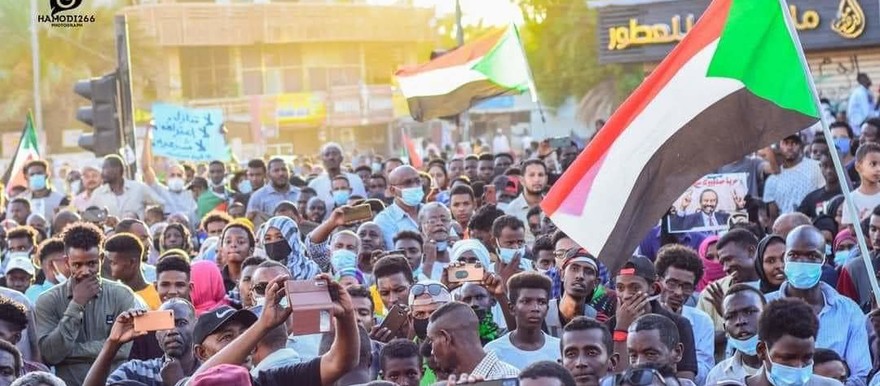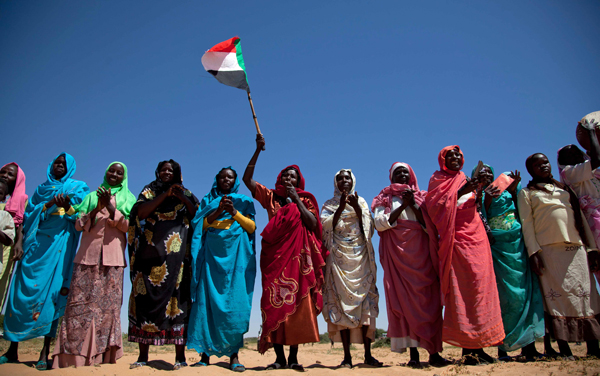Darfur Women Action Group (DWAG) is extremely alarmed by the ongoing systematic and escalated attacks in Jebel Moon, West Darfur. We are also alarmed about the overall recent increase in violence in Darfur, which has harmed a number of unarmed civilians.
On March 7th, militias launched an attack in Jebel Moon and nearby areas that killed, displaced and injured many civilians. The attacks include gunmen killing two humanitarian workers and injuring seven. The death toll is most recently at 16 from those attacks and there are 16 wounded. In a more recent deadly attack, militiamen killed 20 people and wounded dozens when they set a number of villages on fire including Berdi, Igra and Kafana. Mohamed Abdallah El Doma, the former wali (governor) of West Darfur, said that the conflicts in West Darfur and Jebel Moon in particular are not tribal conflicts but are “systematic attacks aimed at controlling lands, fertile pastures, and resources such as gold and minerals.” We are saddened and concerned at the loss of life occurring, all in the name of acquiring power and resources.
Furthermore, attackers shot and killed three human rights activists in Jebel Moon. Front Line Defenders, an Irish based organization, confirmed the deaths stating that the activists were assessing human rights violations in West Darfur. Moreover, recurring attacks in Jebel Moon have left at least 36 people dead and 150,000 families displaced. We are extremely saddened and angered to learn of these innocent lives lost and our heartfelt condolences are with the families. Among these recurring attacks, many incidents of sexual violence have also been reported by sources on the ground, where authorities brutally raped and killed women and young girls under 16 years old in an effort to humiliate and instill fear in the community.
In response to the horrifying violence, the resistance committees in West Darfur are organizing protests in front of state government offices condemning the rising violence in Jebel Moon and demanding action to end it. We stand with the brave resistance committees and support their protests.
The Special Representative of the UN Secretary General (STSG) for Sudan, and head of the UN Integrated Transition Assistance Mission in Sudan (UNITAMS), Volker Perthes, expressed deep concern over the escalating violence in Jebel Moon. Mr. Perthes encouraged “Sudanese authorities to work actively to restore stability in the region and urges all parties to act with restraint in order to prevent further violence.” We appreciate Mr. Perthes’s statement but in the face of brutality, statements are not enough. It is imperative that the UN demands an investigation and holds attackers accountable. Mr. Perthes calls for Sudanese authorities to restore stability and act with restraint, but that does not change the situation unless the UN takes practical steps and urges the UN Security Council to provide protection for civilians.
These attacks are extremely alarming and are not isolated incidents. This is systematic violence that has been going on for 20 years and counting. Arab militias, supported by the government in Khartoum, deliberately target indigenous Africans, especially in areas that are rich in natural resources and agriculture in Darfur. We strongly denounce the escalating killing and the injuring of civilians and the burning of their villages. Thousands of victims are left without a home or humanitarian assistance. These attacks in Jebel Moon and across Darfur continue to happen because of the lack of accountability for perpetrators. Therefore, DWAG calls on the international community to take strong accountability measures and pressure Sudan to stop its militias from attacking civilians in Darfur.
We call on the international community, the United States and the UN Security Council to take the following measures;
- Demand an immediate investigation into all violent incidents particularly the killings of innocent civilians and rape of women and children
- Demand Sudan to open unimpeded humanitarian access to those in need
- Impose targeted sanctions on individuals for committing and promoting gross human rights violations, including travel bans and asset freezing on military generals to ensure financial accountability to limit their access to weapons
- Impose measures of criminal accountability and support the ICC to investigate the past and present crimes and to bring those responsible to face trial
- Demand that Sudanese authorities disarm the Janjaweed and withdraw its forces from civilian areas, in particular near the areas of camps for the internally displaced, which will protect civilian life and their human rights
- We equally urge our supporters to speak up, spread the word and demand their leaders to take swift action to end the suffering and bring lasting peace and stability in Sudan
It is imperative that the United States and the international community stand with the people of Darfur and Sudan, not the government, by prioritizing accountability, protection of human rights and respect for human dignity in Sudan.
We must continue to make our voice louder and demand accountability. With our collective effort, we can make the difference and end the suffering in Darfur and across Sudan.






